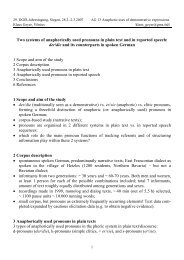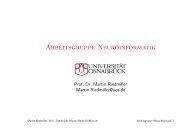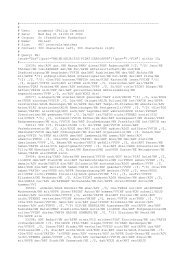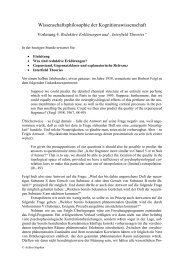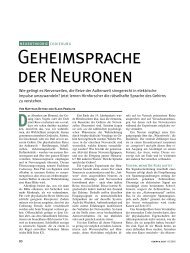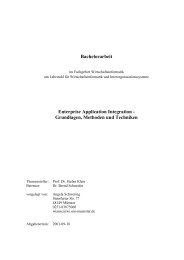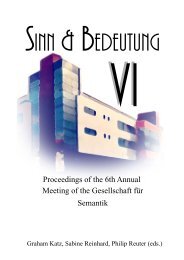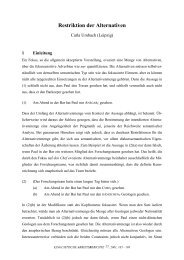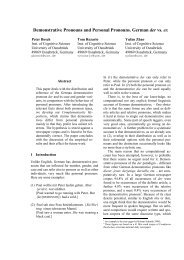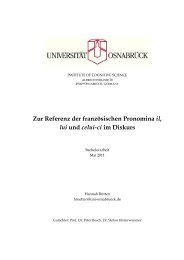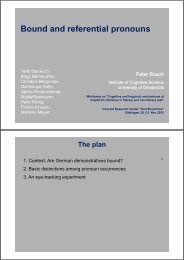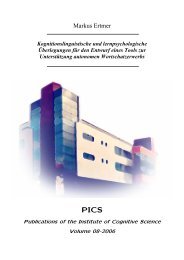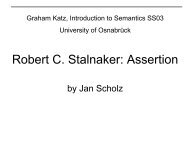Neurobiopsychology - Cognitive Science
Neurobiopsychology - Cognitive Science
Neurobiopsychology - Cognitive Science
You also want an ePaper? Increase the reach of your titles
YUMPU automatically turns print PDFs into web optimized ePapers that Google loves.
<strong>Neurobiopsychology</strong><br />
What is your main research focus?<br />
Understanding the human behaviour, and this will require understanding the<br />
brain, under natural conditions. My emphasis is on the processing of natural<br />
stimuli, cross-modal integration, and understanding the relation of action and<br />
perception.<br />
• Natural visual stimuli. Capturing natural visual stimuli with an emphasis<br />
on viewpoint, colour, motion and disparity; Image statistics including<br />
features like luminance, orientation, colour, texture, disparity, motion.<br />
Unsupervised learning of receptive field properties in neuronal<br />
networks interfaced with behaving agents. Adaptation of neuronal<br />
representations in mouse cortex to a naturalistic environment.<br />
Comparison of simulated receptive field with neuronal response<br />
properties in mammalian cortex.<br />
• Cross-modal integration under natural conditions. Integration of visual,<br />
auditory and haptic information in sensory processing. This is<br />
investigated in psychophysical tasks performed by humans,<br />
physiological measurements based on EEG, as well as in artificial<br />
agents. Theoretical investigation of cross-modal interaction in neuronal<br />
networks with an emphasis on the dynamics.<br />
• Overt attention under natural conditions. Contribution of visual features<br />
to a saliency map. Interaction of stimulus features with behavioural<br />
context. Integration of bottom-up and top-down signals in the human<br />
brain (EEG and fMRI) and neuronal networks. Development of<br />
alternative models of overt attention.<br />
• Interaction of action and perception under natural conditions.<br />
Measures of behaviour and decisions, influence of action on the<br />
stimulus statistics, active sensing in rodents and artificial agents.
Where do you want <strong>Cognitive</strong> <strong>Science</strong> Osnabrück to be in 2010? Tell us your<br />
vision!<br />
• A European centre of cognitive science. We form an institute<br />
concentrating on understanding high-level cognitive behaviour. I believe,<br />
that these topics are tightly interrelated and benefit from a combined<br />
study. The institute should offer a wide range of experimental methods,<br />
develop advanced models of human cognition, and create artificial<br />
cognitive agents.<br />
What do you offer for cooperation with the other research groups of our<br />
institute? And what would you like to be offered by them?<br />
• We offer techniques like, eye-tracking, EEG, robot/mouse behaviour,<br />
simulation platform, …<br />
• We happily use any advanced sensor technology, wireless data acquisition,<br />
mobile sensing, tools for language production,<br />
• We highly appreciate collaboration on the topic of simultaneous existence<br />
of analogue and symbolic representations in the brain.<br />
• Language understanding and language production in HCIs.<br />
What are the most important topics that should be worked on within our<br />
institute?<br />
• I think we should not concentrate on a single topic, but cover a fair<br />
selection of high-level cognitive behaviour. These include, but are not<br />
restricted to, (1) all aspects of attention, as it is pervasive phenomenon,<br />
(2) language of course, (3) action planning, which is a wide open field, (4)<br />
emotions, being very human. We should avoid that there is a one-to-one<br />
mapping of groups and techniques onto topics. All/most topics should be<br />
addressed by multiple groups with many different techniques.



